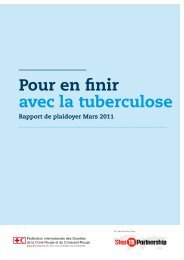Thailand - Stop TB Partnership
Thailand - Stop TB Partnership
Thailand - Stop TB Partnership
Create successful ePaper yourself
Turn your PDF publications into a flip-book with our unique Google optimized e-Paper software.
In Tanzania, where over 50 percent of people living with HIV/AIDS are coinfected with <strong>TB</strong>,<br />
many politicians and local government leaders believe that <strong>TB</strong> is a “disease of the past” that<br />
affects relatively few people and therefore do not consider <strong>TB</strong> a priority.<br />
The scarcity of information and educational resources adapted for use at the community<br />
level is an obstacle to the initiation of awareness-raising efforts. And patients who do<br />
not understand the requirements of treatment are more likely to default, raising the risk of<br />
multidrug-resistant <strong>TB</strong> (MDR-<strong>TB</strong>), which few high-burden countries, including Bangladesh,<br />
Nigeria, Tanzania, and <strong>Thailand</strong>, have the capacity to detect and treat. Brazil has a strong<br />
system in place for treating its relatively few cases of MDR-<strong>TB</strong> but has undertaken a national<br />
investigation to determine whether high treatment default rates could be affecting national<br />
rates of drug resistance. A prominent <strong>TB</strong> doctor in Bangladesh expressed frustration that<br />
so little effort has been made to produce and disseminate culturally sensitive materials in<br />
the local language: “We are producing documents in English—for whom? For the donors!<br />
[We need <strong>TB</strong> materials] in Bangla, Bangla and more Bangla. And we have to remember that<br />
only one in three people can even read Bangla.” 20 Researcher Jamillah Mwanjisi reported<br />
that available information on <strong>TB</strong> in Tanzania is overly technical and jargonistic, especially<br />
in comparison to resources on HIV/AIDS, and that <strong>TB</strong> officials make little attempt to communicate<br />
the basic, essential information that people need in language they can understand.<br />
“There is quite a lot of room for social mobilization around <strong>TB</strong>—for activists to get involved,”<br />
she said. “The problem is that <strong>TB</strong> is so closed to [everyone except] the experts.” 21<br />
People from the communities most affected by <strong>TB</strong> and <strong>TB</strong>/HIV must be involved<br />
in the creation of materials about <strong>TB</strong> that are accurate and sensitive to local social and cultural<br />
contexts. Direct support to community activists and leaders would help them develop<br />
and use such materials to promote <strong>TB</strong> awareness in their communities.<br />
Media involvement<br />
[World <strong>TB</strong> Day is like] a flash of the camera, and then it’s gone.<br />
—Somsak Akksilp, director, Office of Disease Prevention and Control, <strong>Thailand</strong> 22<br />
Except for official statements on World <strong>TB</strong> Day, the NTPs in all five countries have made<br />
little attempt to communicate important information about <strong>TB</strong> through newspapers, television<br />
or radio outlets on a systematic and continuous basis. NTPs generally lack strong communication<br />
strategies and staff has little experience working with the media.<br />
Mirroring the situation within the general population, most journalists know little<br />
about <strong>TB</strong>. Nigerian researcher Olayide Akanni—a journalist herself—found that journalists<br />
are reluctant to report on <strong>TB</strong> because they are not sufficiently aware of the issues. “The<br />
majority of journalists,” she said, “do not even know that <strong>TB</strong> is an issue.” 23 At one recent<br />
PUBLIC HEALTH WATCH MONITORING REPORTS 17



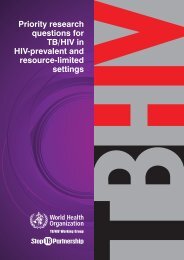
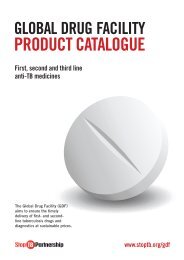
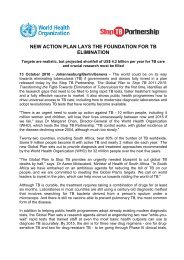

![Global Drug Facility Annual Report 2011 [.pdf] - Stop TB Partnership](https://img.yumpu.com/26788745/1/184x260/global-drug-facility-annual-report-2011-pdf-stop-tb-partnership.jpg?quality=85)

![Concept note on national stop TB partnership [.pdf]](https://img.yumpu.com/26788741/1/184x260/concept-note-on-national-stop-tb-partnership-pdf.jpg?quality=85)

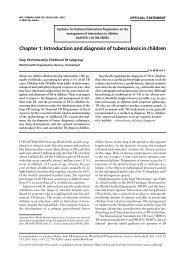
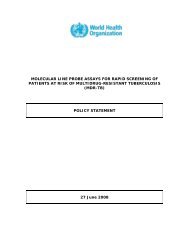
![2005 and Challenges for 2006 - 2015 [.pdf] - Stop TB Partnership](https://img.yumpu.com/26788674/1/190x245/2005-and-challenges-for-2006-2015-pdf-stop-tb-partnership.jpg?quality=85)
![Brochure (French) [.pdf] - Stop TB Partnership](https://img.yumpu.com/17234792/1/190x91/brochure-french-pdf-stop-tb-partnership.jpg?quality=85)

